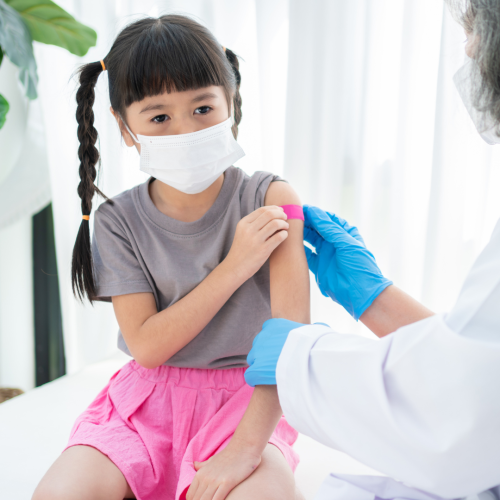
Flu Season is Here – Keep your Little One’s Flu Free
October 7, 2022
Bond With Your Child This Holiday Season
December 8, 2022Most children under the age of two contract RSV at least once. Many of these infants’ symptoms are consistent with symptoms of the common cold, although some children become very ill with RSV. Continue reading to learn how you can protect your child from getting RSV and what you should do if they are diagnosed with this illness.
What is RSV?
Respiratory Syncytial Virus (RSV) is a virus that causes respiratory illness. This virus affects the lungs, throat, and nose and usually occurs from late Fall through early spring months. Due to the social distancing and mask-wearing in 2020 amid the COVID-19 pandemic, other seasonal respiratory illnesses like RSV and Influenza (Flu), there were fewer cases; however, both RSV and the Flu have been steadily on the rise since pandemic safety measures have relaxed.
Symptoms of RSV in Infants
RSV in infants and children typically lasts five to seven days and possesses cold-like symptoms, which can convert into a lower respiratory tract infection, like Bronchitis or Pneumonia. Are you aware of the signs of a common upper respiratory tract infection vs. a lower respiratory tract infection? We will break them down for you:
Symptoms of an Upper Respiratory Tract Infection
- Sneezing
- Cough
- Fussiness
- Runny nose
- Congestion
- Fever (100.4 or higher)
- Reduced appetite
Symptoms of a Lower Respiratory Tract Infection
- Heavy breathing
- Wheezing
- Chest caving
- Head bobbing while breathing
- Nostril flaring
- Change in color of the skin, tongue, lips, or gums
Call your child’s pediatrician if they exhibit symptoms of RSV or a lower respiratory tract infection. If you believe your child may be experiencing a medical emergency, seek immediate medical care at your local Emergency Room.
How to Tell if Your Child is Experiencing Trouble Breathing
Since babies can’t talk, it can often be challenging to understand when they are experiencing discomfort or pain, but there are symptoms you can look out for when determining if your child is having trouble breathing. Chest wall retraction occurs when infants use the muscles between their rib cage or neck to breathe. Look at your child’s ribcage as they inhale; if you see if forming an upside-down “V” under their neck, they are working too hard to breathe.
How you Can Protect Your Infant from RSV
Immunizations play an essential role in keeping your infant protected from RSV. Ensuring that your family receives their annual flu shot and keeping your children up to date on their vaccinations is also vital. Other ways to protect your child from RSV include:
- Limiting exposure to others who may be sick and keeping them home from childcare or school when they are sick.
- Wash your hands for at least twenty seconds. For children, a bit older, teaching them good hand hygiene year-round can aid in eliminating risks of falling ill with RSV and other viruses.
- Disinfect objects in the home regularly, such as countertops, high-traffic areas, doorknobs, etc.
- Avoid exposure to smoke, tobacco, or other substances that can affect your child’s developing lungs.
How to Help Your Child Through an RSV Diagnosis
There is currently no cure for RSV. If your child becomes diagnosed with RSV, here are some things parents can do to help ease the discomfort:
- Keep your child hydrated: For infants still unable to drink water, keeping hydrated with breastmilk is essential. If your child has trouble breastfeeding due to compromised breathing, consider feeding via a bottle.
- Nasal saline: A nasal saline with a gentle suction will allow your child to breathe more accessible, especially while feeding.
- Humidifier: Cool-mist humidifiers are great at breaking up mucus in your babies’ lungs, allowing for easier breathing.
- Medications: Ibuprofen and Acetaminophen may be an option for children over six months. Avoid giving your child cough and cold medications or Aspirin.
Are you concerned about your child’s health? SuraMed Health Center is here to put your worries to rest. We work alongside parents to keep children happy and healthy. We have multiple pediatrics clinics to better serve you in West Palm Beach, Wellington, Greenacres, Boca Raton, and Port St. Lucie. To schedule an appointment, fill out this form.





